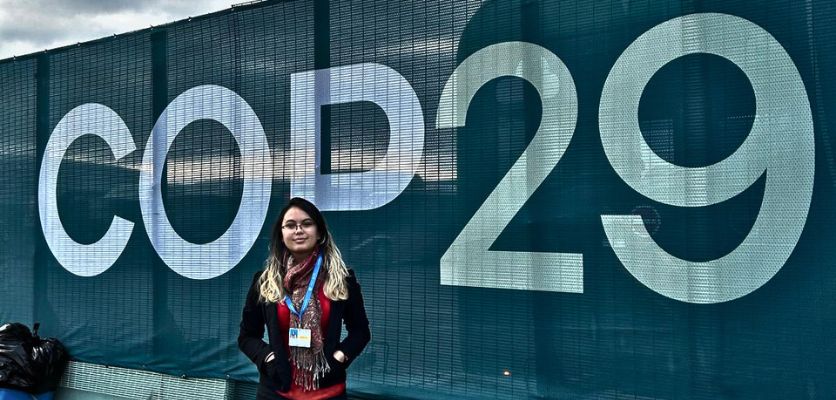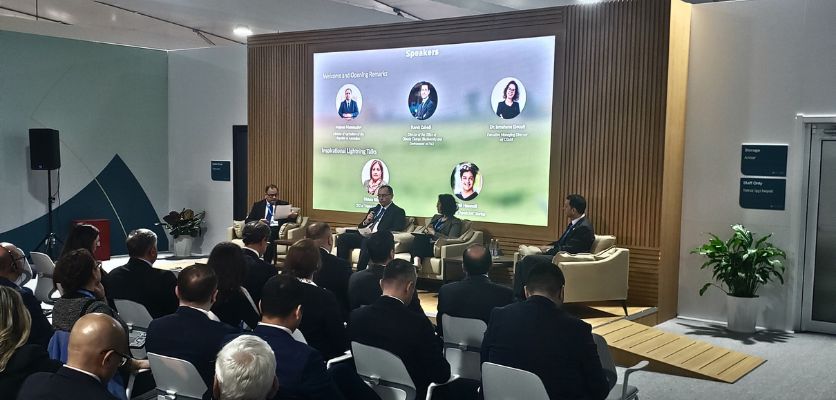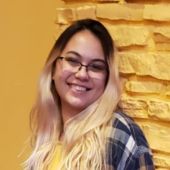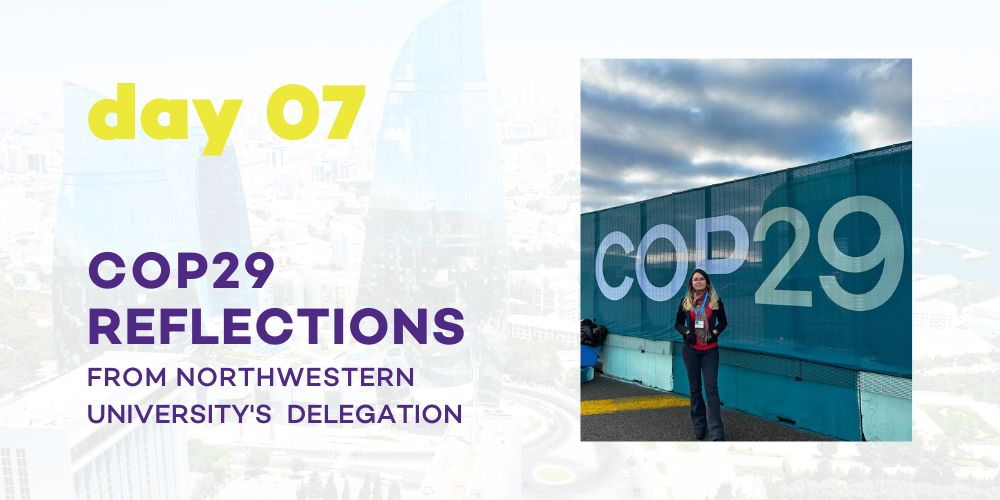Reflections from Northwestern University's COP29 Delegation: Day 7
For a fourth year, a delegation of Northwestern University students and faculty supported by the Buffett Institute is among more than 30,000 researchers, policymakers, industry leaders and activists at the world’s largest annual international treaty negotiations and climate summit, the 29th Conference of Parties (COP29) to the United Nations Framework Convention on Climate Change (UNFCCC), this year hosted in Baku, Azerbaijan. Each day, a different Northwestern delegate is blogging about their experiences and reflections. Day 7 features Danielle Ortiz, a PhD candidate in the Department of Political Science.
There is a moment of surrealness upon arrival at COP, a sense of “being there.” However, instead of finding it grounding, I felt disoriented; the space was somehow larger and more imposing than pictures could convey. Within COP, there are two main areas: the blue zone (the official UN space in which negotiations take place, which requires a badge and recognition letter from the UNFCCC) and the green zone (the civil society component, which requires registration and reserving a free ticket). I spent my first day at COP29 in the green zone, which is further divided into various conference rooms, pavilions and other spaces.
The day began grey and rainy. After waking early for our 6:30 a.m. meeting, we departed for the arena, braving the drizzle to walk to the bus. Upon arrival, we went through security and received our badges for the week. From there, our group split in two to head off to our prospective zones. The green team then had to wait 45 minutes for the ticket booth to open since we arrived on the rest day when operations were temporarily shut down. After the wait, we retrieved our tickets, went through a second layer of security and arrived.

Danielle Ortiz in front of one of the outdoor barriers after the morning’s rain had cleared.
It was only once I had savored my coffee that I headed off to my first event: a 15-minute talk at the main stage of Extreme Hangout. A low stakes beginning to ease my way in. The talks in the series were rapid fire, delivered with speed in a darkened room with only a few shallow rows of chairs, half empty. It took me some time to find the “main stage,” I had thought the opening was just running late before realizing it was tucked into a separate room off to the side of the area. After a few talks, the MC for the series remarked that it was fuller than he expected before asking if many of us were part of the same group. We were not, although the crowd favored English-speaking students.
In contrast, my second event was in the Water Conference Room, a more high-profile venue, warranting a translation booth and several photographers taking photos throughout. This space held several times the number of people, and nearly every seat was filled. The hour-long event was similarly fast-paced: packed in was a three-person opening panel, two rapid fire talks, another panel and a closing speaker. Unlike in the Extreme Hangout, attendees covered a range: some sporting the headsets necessary to hear a translator, others adorned with the pink label of a party badge (a detail I only noticed because of Diana’s advance warning). And many stayed to chat with the speakers at the end, even if they whispered during the talk itself.

AgriFuture 2024: Climate-Resilient Agriculture Empowering Women, Youth and Innovation for a Sustainable and Equitable Future, an event in the Water Conference Room in the green zone.
COP itself acts as a complex ecosystem of sometimes-subtle signals determining who speaks and when. This is structured into the space, with some areas more curtailed off than others, both in terms of the physical enclosure and the gatekeeping of areas like the blue zone. To capture these differences, our team collects a variety of types of data—from the photos included here to the notes this re-telling is based on. In doing so, I metaphorically reconstruct the space for you, revealing or perhaps inscribing the meaning therein. Tomorrow, we go again.

Danielle Ortiz is a PhD candidate in the Department of Political Science at Northwestern University. Her dissertation explores environmental alienation and embedded practice as a countervailing process, focusing on the food system as a site of resistance. One of her current papers considers the discard of recognizable animal body parts (e.g., fish heads) in Western society as structured around the abject horror of confronting meat as the flesh of a once-living creature. This rejection parallels the xenophobic exclusion of more embedded cultures, and likens consumptions of these parts to barbarism, demonstrating the linkage between civilizing discourse and alienation from the environment.

